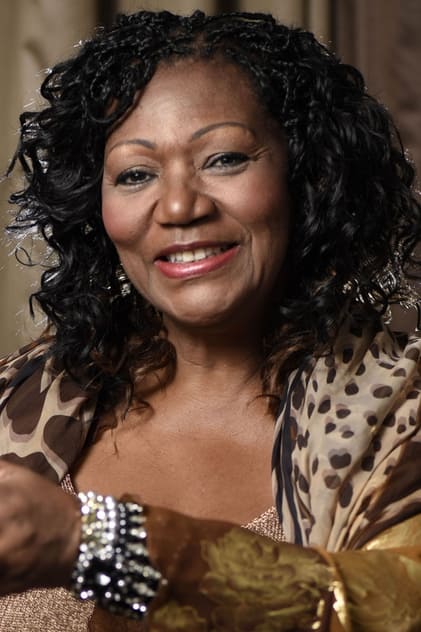

Liz Mitchell
Born: July 12, 1952
in Clarendon, Jamaica
in Clarendon, Jamaica
Elizabeth Rebecca Mitchell (born 12 July 1952) is a Jamaican-British singer, best known as one of the original singers of the 1970s disco/reggae band Boney M.
Mitchell was born in Clarendon Parish, Jamaica. At the age of eleven, Mitchell and her family emigrated to London, England, in 1963; her childhood home was in the district of Harlesden. By the end of the decade, she auditioned for Hair and eventually moved to Berlin to join the German cast where she replaced Donna Summer. After Hair, Mitchell joined the Les Humphries Singers for a few years and represented Germany at the Eurovision Song Contest with the Ralph Siegel title "Sing Sang Song". The band was then reduced to only six singers (Liz was not one of them) for the show (their usual line-ups consisted of 20 performers and up) and came in 15th place with only 12 points, which they regarded as their beginning of the end as a band.
A phone call from Katja Wolff agency in February 1976 persuaded Mitchell to return to Germany to join a new group being assembled by record producer Frank Farian which would become known as Boney M. Though the group's initial purpose was simply to lip-synch for TV and discothèque performances of Farian's song "Baby Do You Wanna Bump", Boney M. soon became a legitimate recording group with Mitchell, Marcia Barrett, and producer Farian as the vocal core. Mitchell became widely regarded as Boney M.'s lead vocalist. Farian later stated that "All members (of Boney M.) could be replaced, except Liz".
Although Boney M was largely a Farian vehicle for his own songwriting, Mitchell is credited as co-composer of the Boney M song, "African Moon", which appeared on their album, Boonoonoonoos (1981). Though she did not contribute significantly as a songwriter, Mitchell's vocals are widely regarded as the most distinctive part of the Boney M. sound.
Boney M. would disband in 1986.
After the group split up shortly after their 10th anniversary in 1986, fellow group member Bobby Farrell convinced Mitchell, Maizie Williams and a replacement for Marcia Barrett to re-group for a tour in 1987. A recording contract for the group was also arranged. When Farrell and the replacement singer failed to show up for the rehearsals, Mitchell and Williams recruited singer Celena Duncan and dancer Curt Dee Daran for the tour. As Williams had never sung on Boney M.'s recordings, Mitchell ended up recording the scheduled album on her own.
However, it proved difficult for Mitchell to find a record label to release the album, entitled No One Will Force You. It was released in Spain in the Autumn of 1988, supported by the singles "Mandela" (a re-work of Boney M.'s 1979 hit "El Lute") and "Niños De La Playa" (Children of the Beach). The latter was also released on Mega Records in Scandinavia where the group did a tour in October. By this point, Williams had been replaced by Carol Grey.
At the same time, Simon Napier-Bell had produced a remix album of Boney M.'s greatest hits and wanted the original line-up to promote it. Mitchell reluctantly accepted the offer and Boney M. appeared together again on German TV, even though Mitchell's new line-up still had gigs to play. ...
Source: Article "Liz Mitchell" from Wikipedia in English, licensed under CC-BY-SA 3.0.
Mitchell was born in Clarendon Parish, Jamaica. At the age of eleven, Mitchell and her family emigrated to London, England, in 1963; her childhood home was in the district of Harlesden. By the end of the decade, she auditioned for Hair and eventually moved to Berlin to join the German cast where she replaced Donna Summer. After Hair, Mitchell joined the Les Humphries Singers for a few years and represented Germany at the Eurovision Song Contest with the Ralph Siegel title "Sing Sang Song". The band was then reduced to only six singers (Liz was not one of them) for the show (their usual line-ups consisted of 20 performers and up) and came in 15th place with only 12 points, which they regarded as their beginning of the end as a band.
A phone call from Katja Wolff agency in February 1976 persuaded Mitchell to return to Germany to join a new group being assembled by record producer Frank Farian which would become known as Boney M. Though the group's initial purpose was simply to lip-synch for TV and discothèque performances of Farian's song "Baby Do You Wanna Bump", Boney M. soon became a legitimate recording group with Mitchell, Marcia Barrett, and producer Farian as the vocal core. Mitchell became widely regarded as Boney M.'s lead vocalist. Farian later stated that "All members (of Boney M.) could be replaced, except Liz".
Although Boney M was largely a Farian vehicle for his own songwriting, Mitchell is credited as co-composer of the Boney M song, "African Moon", which appeared on their album, Boonoonoonoos (1981). Though she did not contribute significantly as a songwriter, Mitchell's vocals are widely regarded as the most distinctive part of the Boney M. sound.
Boney M. would disband in 1986.
After the group split up shortly after their 10th anniversary in 1986, fellow group member Bobby Farrell convinced Mitchell, Maizie Williams and a replacement for Marcia Barrett to re-group for a tour in 1987. A recording contract for the group was also arranged. When Farrell and the replacement singer failed to show up for the rehearsals, Mitchell and Williams recruited singer Celena Duncan and dancer Curt Dee Daran for the tour. As Williams had never sung on Boney M.'s recordings, Mitchell ended up recording the scheduled album on her own.
However, it proved difficult for Mitchell to find a record label to release the album, entitled No One Will Force You. It was released in Spain in the Autumn of 1988, supported by the singles "Mandela" (a re-work of Boney M.'s 1979 hit "El Lute") and "Niños De La Playa" (Children of the Beach). The latter was also released on Mega Records in Scandinavia where the group did a tour in October. By this point, Williams had been replaced by Carol Grey.
At the same time, Simon Napier-Bell had produced a remix album of Boney M.'s greatest hits and wanted the original line-up to promote it. Mitchell reluctantly accepted the offer and Boney M. appeared together again on German TV, even though Mitchell's new line-up still had gigs to play. ...
Source: Article "Liz Mitchell" from Wikipedia in English, licensed under CC-BY-SA 3.0.
Movies for Liz Mitchell...

Title: Sheila, toutes ces vies-là
Character: Self (archive footage)
Released: December 24, 2022
Type: Movie
The portrait of a woman who remembers. Sheila tells the story of Sheila, without concessions or evasions. Her childhood, her parents, her beginnings, the rumors, her love affairs, her marriage, her son, her successes, her farewells, her return, her mourning. The journey of an extraordinary popular icon who never stopped fighting. The courage of an artist who never gives up. "Sheila, toutes ces vies-là" is also a journey through time. 60 years of pop music, punctuated by numerous archives, personal films, timeless hits and illustrations by Marc-Antoine Coulon. But also 60 years of fashion, through a legendary wardrobe (her TV show outfits) that Sheila invites us to rediscover.


Title: La TV des 70's : Quand Giscard était président
Character: Self (archive footage)
Released: January 7, 2022
Type: Movie
In May 1974, Valéry Giscard d'Estaing became President of the Republic and wanted to bring about a new era of modernity. One of his first decisions was to break up the ORTF with the creation of three new television channels: TF1, Antenne 2 and FR3. Three new public channels but autonomous and competing. It is a race for the audience which is engaged then, and from now on the channels will make the war! This competition will give birth to a real golden age for television programs, with variety shows in the forefront. The stars of the song are going to invade the living rooms of the French for their biggest pleasure. This unedited documentary tells the story of the metamorphosis of this television of the early 1970s, between freedom of tone, scandals, political intrigues and programs that have become mythical.




Title: Willkommen bei Carmen Nebel
Character: Self
Released: January 31, 2004
Type: TV




Title: Boney M: The Greatest Hits
Character: Self
Released: November 26, 2001
Type: Movie
Compilation demonstrating the sequined glamour and diaphanous disco genius that was Boney M. Features 'Rivers of Babylon' and 'Rasputin'.






Title: Boney M. on the Road - Jamaica 1981
Character: Self - Boney M.
Released: December 12, 1981
Type: Movie






Title: Disco Fieber
Character: Self
Released: March 15, 1979
Type: Movie
The adventures of a group of over-sexed high school students.




Title: Numéro un
Character: Self - Boney M.
Released: April 5, 1975
Type: TV
A French variety show.


Title: Les Rendez-vous du dimanche
Character: Self - Boney M.
Released: January 12, 1975
Type: TV
A talk show presented by Michel Drucker


Title: Midi Première
Character: Self - Boney M.
Released: January 6, 1975
Type: TV
Midi Première is a French variety show presented by Danièle Gilbert, directed by Jacques Pierre and broadcast from January 6, 1975 until January 1, 1982 on TF1. The program was generally broadcast between 12:15 p.m. and 12:55 p.m., then giving way to the 1:00 p.m. TV news. However, the broadcast schedule could change, depending on the guests, and the setting where the recording of the program was shot. Certain performances by artists who have become cult like the one where Ringo jostles with a demonstrator in interpretation (1977), that of Dalida with the title There is always a song with the soundtrack that does not start, twice, at the right speed (1978), Claude François and his Clodettes, who, in the provinces, are unable to join "the set" in order to interpret his song, the latter being taken by the crowd of delirious fans (summer 1977) . The group Supertramp performed there with the title "Dreamer" on March 8, 1975.
